INTERVIEW: FIRE & DUST MEETS GENEVIEVE CARVER
A BEAUTIFUL WAY TO BE CRAZY BY GENEVIEVE CARVER
Verve Poetry Press
ISBN 978-1912565351
£9.99/96 pages
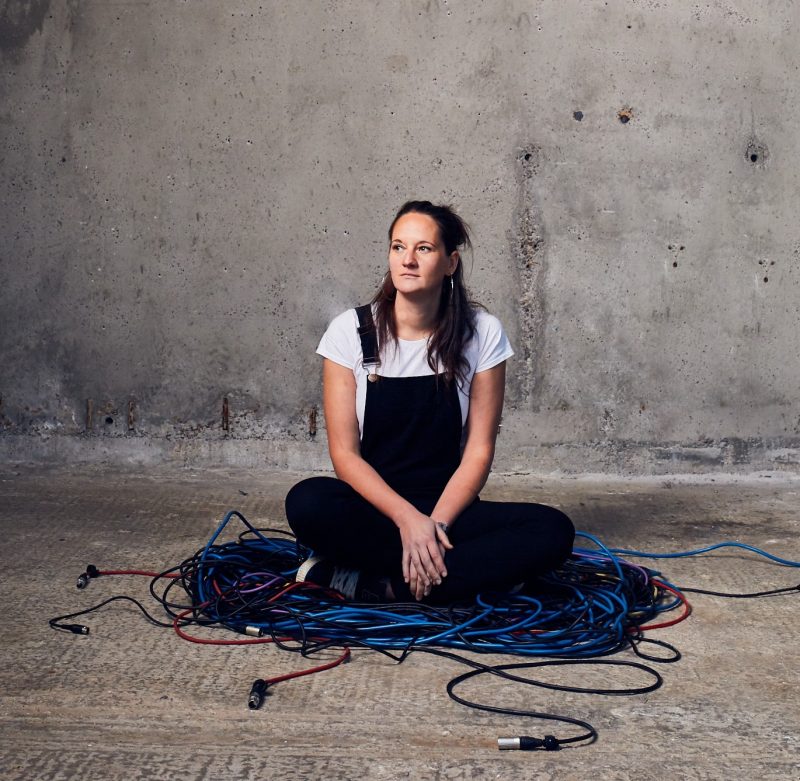
She wears it on her sleeveless dress,
____that one
holds it in the palm of her
________________please never let go.
Too busy spilling herself,
she trusts it to dance-floor corners
surfing supermarket trolleys home____alone
_________________________________with friends
and falling deep in wanderlust
with everyone she meets
she offers it on a silver does it matter
______lets the vultures feed.
Look at her, poor thing;
______they will string her up by her guts.
___________________________(‘Her Heart’ from A Beautiful Way to Be Crazy, p.12)
Genevieve Carver is a writer and performer based in Sheffield. Her poetry has been published in journals including Iota, Envoi and The North (plus a poem forthcoming in HCE’s Green Issue). Her first collection A Beautiful Way to be Crazy was published by Verve Poetry Press in 2020. A live show of the same name combines spoken-word with music from critically acclaimed gig theatre ensemble Genevieve Carver & The Unsung, and explores female experiences in the music industry. Genevieve also writes for theatre and television.
On Thursday 6th August, Genevieve joined us as special guest poet at our fifth virtual Fire & Dust gig. She performed an excellent headline set; people in the audience praised her words as “inspiring” and “spellbinding”, with “amazing movement of imagery”. We caught up with Genevieve after the gig, to ask a few questions…
HCE: Can you tell us about your journey as a writer so far, and what first inspired you to get into poetry?
GC: I’ve loved poetry since I was a child and whilst I was at uni in London I wrote some truly terrible poems trying to address politics and global issues. But I only really got into writing with any level of seriousness when I moved to Sheffield. I was really lucky in finding a buzzing and welcoming spoken word scene here, and started doing my first open mics in about 2011, when I was 25. I was working full time as an archaeologist then, but began to do more and more writing and performing, and started to get booked locally for featured slots.
In my late 20s I quit my archaeology job and started working part-time in a café and doing as much poetry as I could in-between. I formed my band The Unsung in 2016, and began to tour further afield as well as getting a few poems published in journals and magazines. Over time I’ve been able to shift more and more of my focus and income to writing and performing, and am now fully self-employed. I’ve had some great opportunities recently, including being apprentice poet in residence at Ilkley Literature Festival, working in a writer’s room on a new drama series for Sky TV, collaborating with a movement artist a new piece for stage, and the publication of my first collection by Verve.
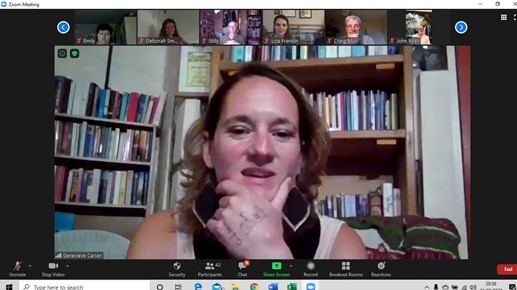
HCE: In your own words, what can people expect from A Beautiful Way to Be Crazy? Is there a particular message you’re hoping audiences take away from it?
GC: The show explores female experiences in the music industry. It’s a piece of gig theatre combining spoken word with live music from my band of three multi-instrumentalist musicians, as well as audio clips from interviews I conducted with female music practitioners.
During the research process I talked to singers, instrumentalists, sound engineers, producers and events promoters and covering genres from classical to folk, electronica, rock, pop and jazz. I interviewed performers in a sex workers’ opera, internationally touring DJs and members of an all-female band of adults with learning difficulties. The Unsung has always been about bringing to the fore the stories of people who otherwise wouldn’t be heard, so it felt right to talk about my own experiences alongside a diverse range of other voices.
The poems also cover broader themes to do with mental health, confidence and self-esteem. I hope that audiences of all genders will leave feeling more accepting of themselves.
HCE: Some of your poems take experimental risks that pay off really well – the collection is packed with variety! Do you push yourself to seek out new ways of formatting poems and representing ideas, or does it just happen naturally?
GC: I don’t really think of my poems as taking experimental risks, but I’m interested in the relationship between the sonic and aesthetic qualities of language, and emotional meaning. I think poetry allows you to make sense of things that are difficult to express in ‘normal’ language.
HCE: Many of your poems seem to launch from ordinary moments and events (e.g. filling out a council tax form, car journeys, decorating the living-room) and then spin off into exploring something original and more abstract. In your view, is there potentially poetry everywhere, in everything?
GC: Yes, definitely. I think the way we live in modern-day consumerist society is totally absurd in itself. You say a car journey is ordinary, but in order to get to that point humans had to invent the combustion engine, build roads, learn to wear clothes, create complex legal systems. That’s so far away from what we evolved to do as apes. I’m constantly floored by it.
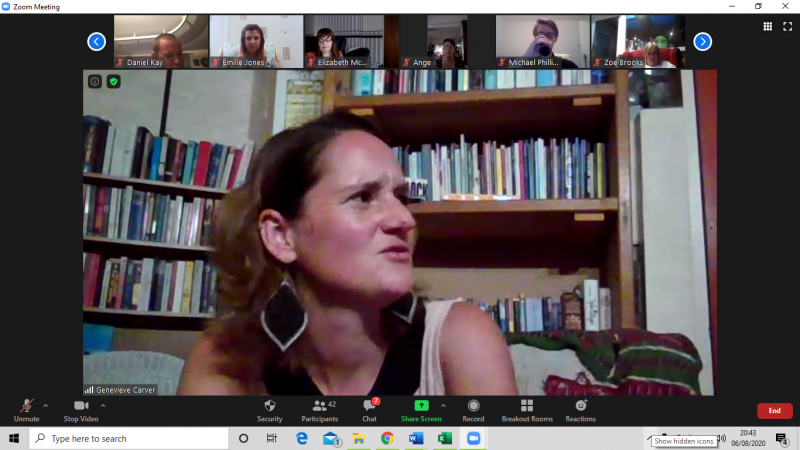
HCE: Your poetry struck us as very topical and relevant – politically and socially – with disparities between social classes and between genders coming up throughout the book. In your opinion, are there moves creative communities should make to ensure more working-class voices and women’s voices feel welcome and get heard?
GC: Yes, but intersectionality is important and dialogues around class and gender should also be aware of issues of race, sexuality and disability. With A Beautiful Way to be Crazy, I aimed talk to interviewees that represented as many different groups as possible, but perhaps I could have done more in terms of the representation you see on stage. I’m a white, middle–class writer, which doesn’t make my experience invalid but it is important to be conscious of that privilege. An important aspect of this project has been collaborating with other female artists, whether it’s been offering a support slot to younger artists like Kira Craig who did her first gig with us aged 13, or working with other Sheffield acts like Before Breakfast on our single ‘Little Green’, which we’re selling to raise money for Refuge domestic violence charity.
HCE: The final section of poems in your book (taken from the stage show) explores the obstacles experienced by women in the music industry. Was there a significant point in your life when you struggled with self-esteem and confidence to share/perform your poetry – and how did you overcome this?
GC: Yes, although I’m not really sure I’ve overcome it – it’s a constant process, with ups and downs. I was badly bullied at school and sometimes I think the experiences you have through your teenage years are so formative that I’ll never really be able to shake that feeling of shame and of not being good enough. That’s probably why I’m so eager to prove myself. But I have found collaborating with other artists to be very inspiring and nourishing, and when audience members tell me that my work means something to them, it gives me the confidence to keep going.
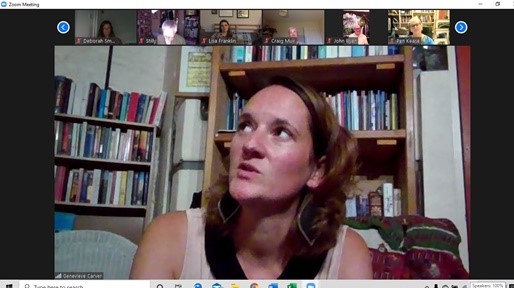
HCE: Do you engage with a lot of poetry yourself, and does this have an influence on your own work? Which collections or poets have recently made an impression on you?
GC: Yes, I read a lot of poetry. Some things I’ve loved recently have been The Air Year by Caroline Bird, The Perseverance by Raymond Antrobus, Near Future by Suzannah Evans and Hera Lindsay Bird by Hera Lindsay Bird.
HCE: Has COVID-19 made it difficult to promote the new book, or have you managed to plan events around the lockdown situation? And will there be ways for people to still attend the live show?
GC: It was pretty odd because I was mid-way through a UK tour of both the full show and the book, so yes, it hasn’t had the exposure it would have had. But we are currently recording all the poems from the show as a studio album, and we plan to broadcast a filmed performance of the whole show online in the autumn.
HCE: You mentioned at Fire & Dust that it wasn’t your first online poetry gig. Some poets find that performing via a screen only presents new challenges, while others feel it offers more scope for creativity. Are you enjoying the experience of virtual events?
GC: I’m really enjoying having the pressure taken off live performances, and not spending hours travelling to gigs for very little money. However, I think you do lose the connection you make with audiences when performing online – I miss chatting to people at the bar afterwards.
HCE: Does Sheffield have a thriving spoken word scene?
GC: Yes. I’d recommend Verse Matters, Wordlife and All Mic Long (run by the Sheffield University Poetry Society). There’s also the Sheaf Poetry Festival happening online in November, for which I will be poet in residence.
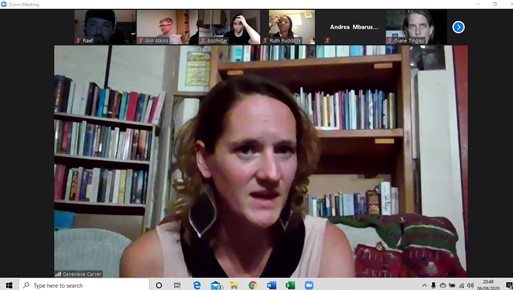
People can keep updated about Genevieve’s work, gig bookings, etc. on:
HCE: Anything we didn’t cover that you’d like to share with our readers?
GC: Thank you for having me!
Copies of Genevieve’s collection A Beautiful Way to Be Crazy and Other Poems from the Stage are available for purchase from her website.
